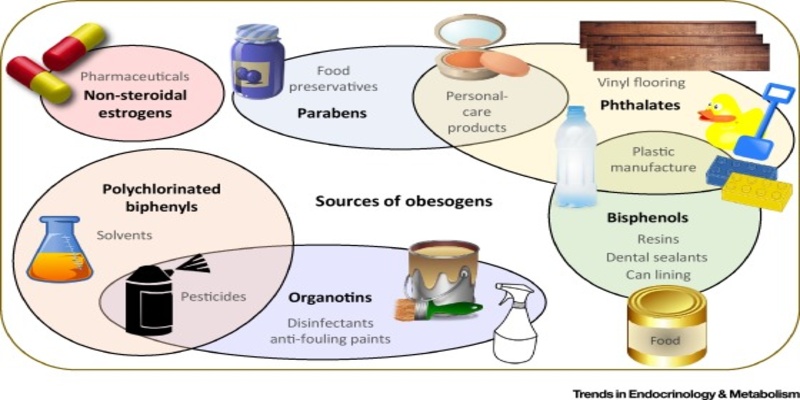There are two substances in endocrine-disrupting chemicals (EDCs) that are artificial or natural substances that can imitate, inhibit, or affect the hormones that make up the endocrine system in the body.
Commonly, these substances are connected to other health problems, so these chemicals are bad for you as they can mess with your hormones
They are not only linked with female illnesses, but they are also fatal for males. They can cause serious problems in both of them, such as reproductive systems, diabetes, obesity, the immunological system, thyroid disease, osteoporosis, and cancers that are connected with hormones.
You will notice that scientists are interested in human health or the substances that can disturb it, so in order to enhance your health, you can study those scientific research studies and benefit from it.
If you want to know more about endocrine-disrupting chemicals, you came to the right place because, in this article, you will get all the information you need to know about endocrine disruptors and how to avoid them.
Endocrine Disruption's Effects

We might come into contact with a number of dangerous substances each day without even realizing it. For instance, these lethal substances can be found in the food that we eat, the water we drink, and other everyday endocrine disruptors products that we use. These chemicals are capable enough to harm our bodies, so we must try to take precautions in order to avoid them.
In the last twenty years, it has been observed that people now know more about the possible harm that drugs can do to the endocrine system, both in humans and wildlife.
- Improvement defects
- Reproductive disruption
- Rlevated cancer risk
- Immunological and neurological system dysfunction
These are a few examples of these consequences.
There is enough proof that certain chemicals can have these effects on wildlife. However, it is deadly for humans
Effects of Endocrine Disruptors

Endocrine disruptors can damage our bodies in the following three ways:
- They might obstruct a natural hormone's receptor route.
- They could directly affect our glands, which leads them to produce an excessive or poor amount of hormones.
- They could serve as a hormonal surrogate, making the body overreact or act up.
Endocrine Disruptor Sources
They fit into the following broad categories:
- Industrial
- Residential
- Agricultural
- Pharmaceutical
- hefty metals
- Human Endocrine Disruption
Researchers have recently found evidence of hormone disturbance in lab animals and nature. Aside from this, less progress has been made in showing that endocrine disruption affects people broadly.
Not only this, but similar difficulties arise in finding the effects of these compounds on people; even many researchers confidently claim that there is a connection between the rise in particular diseases and the rising usage of chemicals by humans in recent years.
It is said that the rate at which genetic changes occur is too slow to be responsible for the rise in these illnesses.
So, to overcome the situation, medication was prescribed to them by their doctors to deal with troublesome pregnancies. After years of research, medical professionals found that those who were DES users were more likely to get several cancers.
For now, researchers are closely monitoring the DES users to see if they also experience any issues.
Investigations into Endocrine Disruptors

The consequences of everyday endocrine disruptors are being researched currently, with the possibility that EDCs could worsen the symptoms of ADHD even more.
In this study, teen males also gave their urine samples, which were later tested for endocrine disruptors. Young men with more EDCs in their urine normally show more notable ADHD behaviours. EDCs effects may include:
- Obesity
- Diabetic
- issues with reproduction
- Ovarian cancer
- Breast cancer
- thyroid issues
- matters relating to the prostate
However, total avoidance of endocrine disruptors is not possible, but you can still minimize your exposure to them.
7 Useful Tips to Avoid Endocrine-Disrupting
If you want to know about how to avoid endocrine disruptors, these things will help you a lot.
Purchase Organic Vegetables
Wash your products properly, and peel them if you can't afford them or can't find organic food.
Purchase Basic Foods
Choose meals that are minimally packaged and have undergone little processing.
Select Non-Fragrance Items
The chemicals used by manufacturers to create scents are not required to be disclosed, but people do not usually use these products daily.
Hand Hygiene is Essential.
Doing this will eliminate any chemicals you might have come into contact with. Select the most basic soap available, free of scent or antimicrobial qualities.
Rub your hands quickly to make them cleaner.
Try to Refrain the Use of Plastic
Count the number of plastic items you can eliminate in your house. Keep food in stainless steel or glass containers.
Keep it Tidy
Reduce the amount of chemical particles in your house by using a moist cloth to wipe dust particles and frequent vacuuming. Select a HEPA-equipped vacuum cleaner and replace other air filters regularly.
Select Simple Cleaners
Use common household cleaners like baking soda and vinegar as much as possible. If you require a more robust solution, check for a product with an ingredient list.
Conclusion
In summary, it is crucial to overcome this issue immediately because it is widely spread through everyday items such as endocrine disruptors in cosmetics and has the ability to disturb women's hormonal balance.
In addition, the dangerous health indications—which include developmental problems, reproductive difficulties, and probably even cancer—highlight the urgent need for more strict laws and public education.
However, there is an urgent need for collective efforts in regulation and education.
Through research, the implementation of strict rules, and the promotion of a worldwide commitment to minimize exposure to these chemicals,
But it is possible to protect our health and ecological equilibrium from the detrimental impacts of endocrine disruptors.












